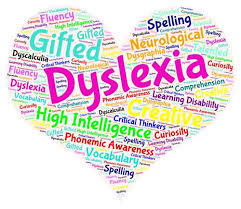Dyslexia

Dyslexia is a learning disorder that involves difficulty reading due to problems identifying speech sounds and learning how they relate to letters and words (decoding). Also called reading disability, dyslexia affects areas of the brain that process language.
People with dyslexia have normal intelligence and usually have normal vision. Most children with dyslexia can succeed in school with tutoring or a specialized education program. Emotional support also plays an important role.
Though there's no cure for dyslexia, early assessment and intervention result in the best outcome. Sometimes dyslexia goes undiagnosed for years and isn't recognized until adulthood, but it's never too late to seek help.
Symptoms
Signs of dyslexia can be difficult to recognize before your child enters school, but some early clues may indicate a problem. Once your child reaches school age, your child's teacher may be the first to notice a problem. Severity varies, but the condition often becomes apparent as a child starts learning to read.
Before school
- Signs that a young child may be at risk of dyslexia include:
- Late talking
- Learning new words slowly
- Problems forming words correctly, such as reversing sounds in words or confusing words that sound alike
- Problems remembering or naming letters, numbers and colors
- Difficulty learning nursery rhymes or playing rhyming games
School age
Once your child is in school, dyslexia signs and symptoms may become more apparent, including:
- Reading well below the expected level for age
- Problems processing and understanding what he or she hears
- Difficulty finding the right word or forming answers to questions
- Problems remembering the sequence of things
- Difficulty seeing (and occasionally hearing) similarities and differences in letters and words
- Inability to sound out the pronunciation of an unfamiliar word
- Difficulty spelling
- Spending an unusually long time completing tasks that involve reading or writing
- Avoiding activities that involve reading
Teens and adults
Dyslexia signs in teens and adults are similar to those in children. Some common dyslexia signs and symptoms in teens and adults include:
- Difficulty reading, including reading aloud
- Slow and labor-intensive reading and writing
- Problems spelling
- Avoiding activities that involve reading
- Mispronouncing names or words, or problems retrieving words
- Trouble understanding jokes or expressions that have a meaning not easily understood from the specific words (idioms), such as "piece of cake" meaning "easy"
- Spending an unusually long time completing tasks that involve reading or writing
- Difficulty summarizing a story
- Trouble learning a foreign language
- Difficulty memorizing
- Difficulty doing math problems
When to see a doctor
Though most children are ready to learn reading by kindergarten or first grade, children with dyslexia often can't grasp the basics of reading by that time. Talk with your doctor if your child's reading level is below what's expected for his or her age or if you notice other signs of dyslexia.
When dyslexia goes undiagnosed and untreated, childhood reading difficulties continue into adulthood.
Causes
Dyslexia tends to run in families. It appears to be linked to certain genes that affect how the brain processes reading and language, as well as risk factors in the environment.
Risk factors
Dyslexia risk factors include:
- A family history of dyslexia or other learning disabilities
- Premature birth or low birth weight
- Exposure during pregnancy to nicotine, drugs, alcohol or infection that may alter brain development in the fetus
- Individual differences in the parts of the brain that enable reading
Complications
Dyslexia can lead to a number of problems, including:
Trouble learning. Because reading is a skill basic to most other school subjects, a child with dyslexia is at a disadvantage in most classes and may have trouble keeping up with peers.
Social problems. Left untreated, dyslexia may lead to low self-esteem, behavior problems, anxiety, aggression, and withdrawal from friends, parents and teachers.
Problems as adults. The inability to read and comprehend can prevent a child from reaching his or her potential as the child grows up. This can have long-term educational, social and economic consequences.
Children who have dyslexia are at increased risk of having attention-deficit/hyperactivity disorder (ADHD), and vice versa. ADHD can cause difficulty sustaining attention as well as hyperactivity and impulsive behavior, which can make dyslexia harder to treat.


